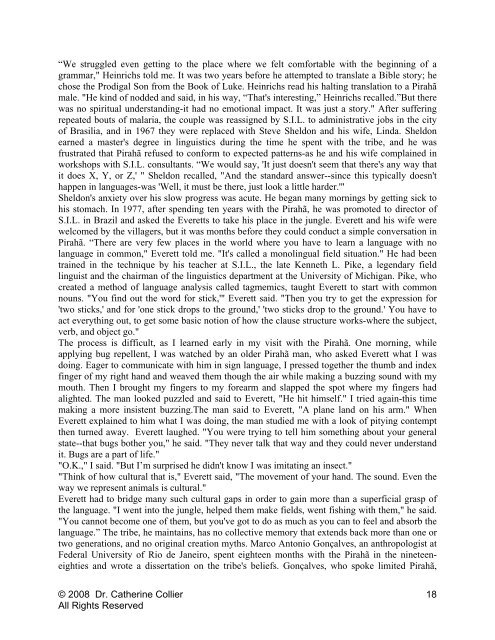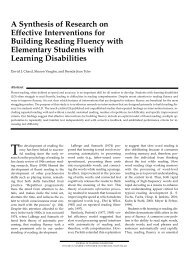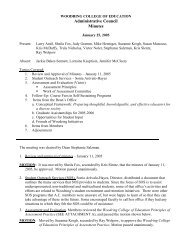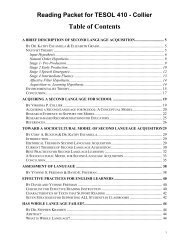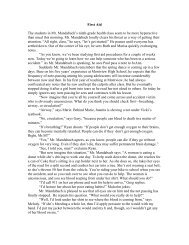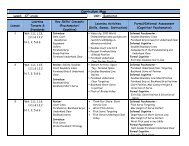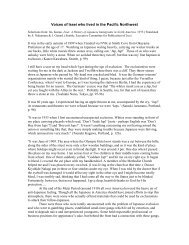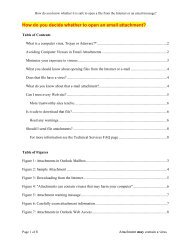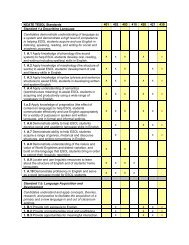Art Un ticle I.1 ited Sta In the ates News - Woodring College of ...
Art Un ticle I.1 ited Sta In the ates News - Woodring College of ...
Art Un ticle I.1 ited Sta In the ates News - Woodring College of ...
- No tags were found...
Create successful ePaper yourself
Turn your PDF publications into a flip-book with our unique Google optimized e-Paper software.
“We struggled even getting to <strong>the</strong> place where we felt comfortable with <strong>the</strong> beginning <strong>of</strong> agrammar," Heinrichs told me. It was two years before he attempted to translate a Bible story; hechose <strong>the</strong> Prodigal Son from <strong>the</strong> Book <strong>of</strong> Luke. Heinrichs read his halting translation to a Pirahãmale. "He kind <strong>of</strong> nodded and said, in his way, “That's interesting,” Heinrichs recalled.”But <strong>the</strong>rewas no spiritual understanding-it had no emotional impact. It was just a story." After sufferingrepeated bouts <strong>of</strong> malaria, <strong>the</strong> couple was reassigned by S.I.L. to administrative jobs in <strong>the</strong> city<strong>of</strong> Brasilia, and in 1967 <strong>the</strong>y were replaced with Steve Sheldon and his wife, Linda. Sheldonearned a master's degree in linguistics during <strong>the</strong> time he spent with <strong>the</strong> tribe, and he wasfrustrated that Pirahã refused to conform to expected patterns-as he and his wife complained inworkshops with S.I.L. consultants. “We would say, 'It just doesn't seem that <strong>the</strong>re's any way thatit does X, Y, or Z,' " Sheldon recalled, "And <strong>the</strong> standard answer--since this typically doesn'thappen in languages-was 'Well, it must be <strong>the</strong>re, just look a little harder.'"Sheldon's anxiety over his slow progress was acute. He began many mornings by getting sick tohis stomach. <strong>In</strong> 1977, after spending ten years with <strong>the</strong> Pirahã, he was promoted to director <strong>of</strong>S.I.L. in Brazil and asked <strong>the</strong> Everetts to take his place in <strong>the</strong> jungle. Everett and his wife werewelcomed by <strong>the</strong> villagers, but it was months before <strong>the</strong>y could conduct a simple conversation inPirahã. “There are very few places in <strong>the</strong> world where you have to learn a language with nolanguage in common," Everett told me. "It's called a monolingual field situation." He had beentrained in <strong>the</strong> technique by his teacher at S.I.L., <strong>the</strong> late Kenneth L. Pike, a legendary fieldlinguist and <strong>the</strong> chairman <strong>of</strong> <strong>the</strong> linguistics department at <strong>the</strong> <strong>Un</strong>iversity <strong>of</strong> Michigan. Pike, whocreated a method <strong>of</strong> language analysis called tagmemics, taught Everett to start with commonnouns. "You find out <strong>the</strong> word for stick,'" Everett said. "Then you try to get <strong>the</strong> expression for'two sticks,' and for 'one stick drops to <strong>the</strong> ground,' 'two sticks drop to <strong>the</strong> ground.' You have toact everything out, to get some basic notion <strong>of</strong> how <strong>the</strong> clause structure works-where <strong>the</strong> subject,verb, and object go."The process is difficult, as I learned early in my visit with <strong>the</strong> Pirahã. One morning, whileapplying bug repellent, I was watched by an older Pirahã man, who asked Everett what I wasdoing. Eager to communicate with him in sign language, I pressed toge<strong>the</strong>r <strong>the</strong> thumb and indexfinger <strong>of</strong> my right hand and weaved <strong>the</strong>m though <strong>the</strong> air while making a buzzing sound with mymouth. Then I brought my fingers to my forearm and slapped <strong>the</strong> spot where my fingers hadalighted. The man looked puzzled and said to Everett, "He hit himself." I tried again-this timemaking a more insistent buzzing.The man said to Everett, "A plane land on his arm." WhenEverett explained to him what I was doing, <strong>the</strong> man studied me with a look <strong>of</strong> pitying contempt<strong>the</strong>n turned away. Everett laughed. "You were trying to tell him something about your generalstate--that bugs bo<strong>the</strong>r you," he said. "They never talk that way and <strong>the</strong>y could never understandit. Bugs are a part <strong>of</strong> life.""O.K.," I said. "But I’m surprised he didn't know I was imitating an insect.""Think <strong>of</strong> how cultural that is," Everett said, "The movement <strong>of</strong> your hand. The sound. Even <strong>the</strong>way we represent animals is cultural."Everett had to bridge many such cultural gaps in order to gain more than a superficial grasp <strong>of</strong><strong>the</strong> language. "I went into <strong>the</strong> jungle, helped <strong>the</strong>m make fields, went fishing with <strong>the</strong>m," he said."You cannot become one <strong>of</strong> <strong>the</strong>m, but you've got to do as much as you can to feel and absorb <strong>the</strong>language.” The tribe, he maintains, has no collective memory that extends back more than one ortwo generations, and no original creation myths. Marco Antonio Gonçalves, an anthropologist atFederal <strong>Un</strong>iversity <strong>of</strong> Rio de Janeiro, spent eighteen months with <strong>the</strong> Pirahã in <strong>the</strong> nineteeneightiesand wrote a dissertation on <strong>the</strong> tribe's beliefs. Gonçalves, who spoke lim<strong>ited</strong> Pirahã,© 2008 Dr. Ca<strong>the</strong>rine CollierAll Rights Reserved18


